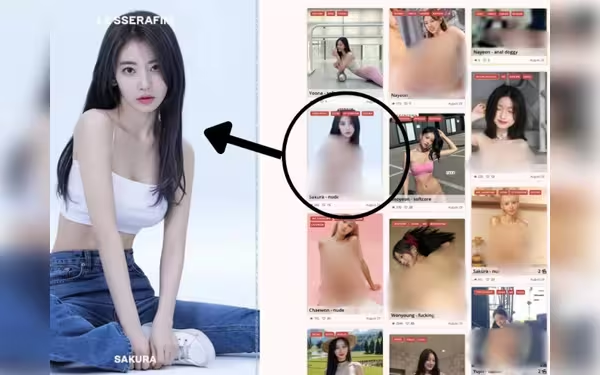Saturday, November 16, 2024 07:40 PM
K-Pop Idols Targeted in Deepfake Scandal
- Deepfake technology exploits female K-Pop idols.
- 53% of deepfake victims are Korean entertainers.
- Fans demand legal action against deepfake creators.
 Image Credits: tribune_pk
Image Credits: tribune_pkThe K-Pop industry faces a crisis as deepfake technology exploits female idols, raising urgent privacy and consent concerns.
The K-Pop industry, renowned for its vibrant performances and global appeal, is currently grappling with a troubling issue that has emerged in recent weeks. The rise of deepfake technology, which uses artificial intelligence to create realistic but fake images, has led to the exploitation of female K-Pop idols. This disturbing trend has linked these idols to the South Korean porn industry, raising serious concerns about privacy and consent.
Deepfake technology allows individuals to superimpose the faces of K-Pop stars onto explicit videos, creating content that is not only misleading but also harmful. These fabricated images are being shared across various online platforms, particularly in illicit chatrooms like "The New Nth Room." This name is a chilling reminder of the previous "Nth Room" scandal, where similar crimes involving the creation and distribution of sexual deepfakes were uncovered.
A recent report by Security Hero, highlighted by the Wall Street Journal, reveals that South Korea is the most vulnerable nation to deepfake sexual crimes. The report analyzed nearly 96,000 videos from ten deepfake porn sites and 85 channels on video-sharing platforms over a two-month period. Alarmingly, it found that 53% of those featured in the deepfake content were Korean singers and actors, underscoring the scale of this issue.
As awareness grows, one particular site has been identified that lists over 100 female K-Pop idols from various generations, including members of fifth-generation groups. This has sparked outrage among fans and the general public, who are calling for immediate legal action to protect the victims and hold the perpetrators accountable. The situation highlights the vulnerabilities that public figures face in an increasingly digital world, where technology can be misused to violate their rights.
In response to this crisis, many fans are taking action. They are encouraged to report these deepfake sites and help remove explicit content from search engines. Steps have been outlined for individuals to follow, emphasizing the importance of community involvement in combating this issue. The call to action is clear: protect the artists and ensure that their dignity is upheld.
The K-Pop industry is at a crossroads, facing a significant challenge that threatens the safety and privacy of its stars. As technology continues to evolve, it is crucial for society to address these issues head-on. By raising awareness and taking collective action, we can work towards a safer digital environment for everyone, especially those in the public eye. The fight against deepfake exploitation is not just about protecting celebrities; it is about safeguarding the rights and dignity of all individuals in our increasingly interconnected world.













